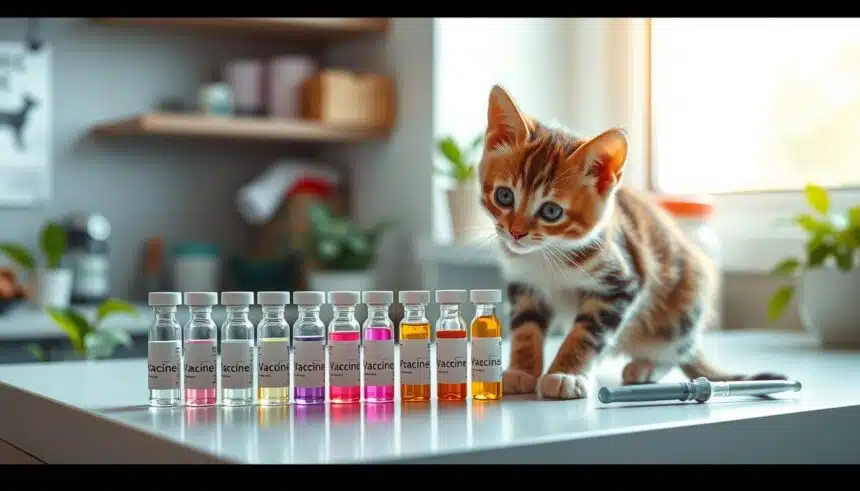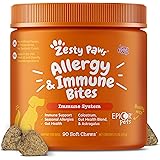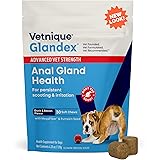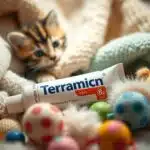A surprising statistic shows that Feline Panleukopenia, or Feline Distemper, is fatal in 90% of untreated cases, especially in kittens. This highlights the need for cat vaccines to keep cats healthy and safe from diseases. Vaccines for cats, including kitten shots, are key to preventing serious illnesses and helping cats live longer, healthier lives.
It’s important for pet owners to understand the role of cat vaccines. Core vaccines, like Rabies, Feline viral rhinotracheitis, and Panleukopenia, are needed for all cats. Non-core vaccines, such as Feline leukemia, depend on a cat’s lifestyle. The FVRCP vaccine protects against feline viral rhinotracheitis, calicivirus, and panleukopenia. It’s a vital part of kitten shots and feline vaccination.
Key Takeaways
- cat vaccines are essential for maintaining a cat’s health and protecting against diseases
- feline vaccination can reduce disease prevalence in the general cat population
- kitten shots, including core vaccines like Rabies and FVRCP, are crucial for preventing life-threatening illnesses
- non-core vaccines, such as Feline leukemia, may be necessary based on lifestyle factors
- understanding the role of cat vaccines is vital for pet owners to ensure their pet’s well-being
- the use of feline vaccination can support a longer, healthier life for cats
Importance of Cat Vaccines for Health
Regular pet immunizations are key for kitty health. Vaccines fight off diseases caused by viruses and bacteria. They help prevent millions of cats from getting sick or dying.
Vaccines work by introducing small amounts of disease-causing organisms to a cat’s body. This helps the cat’s immune system prepare to fight off diseases better.
Kittens get antibodies from their mother’s milk. But these antibodies wear off before the kitten’s immune system is ready. This makes kittens more likely to get sick during this time.
Vaccination schedules can change based on many things. These include the cat’s health, age, lifestyle, and where they live.
Core vaccines protect cats from rabies, feline distemper, and rhinotracheitis. Adult cats need regular boosters to keep their immunity strong. This shows how important it is to have a plan for pet immunizations and know about kitty health.
Common Feline Vaccinations
Protecting your cat’s health is key. Knowing about common feline vaccinations is important. A good veterinary care plan can stop deadly diseases. Core vaccinations like Feline Panleukopenia and Rabies are a must for all cats.
Core vaccines stop diseases from spreading. A good vaccine schedule ensures your cat gets the right protection. Non-core vaccines depend on your cat’s lifestyle and where you live.
Talking to a vet is crucial for your cat’s vaccination plan. They consider your cat’s age, health, and lifestyle. Regular vet visits and a good vaccine schedule keep your cat safe from deadly diseases.
Understanding Vaccination Schedules
Kittens start their vaccinations at 6-8 weeks old. They then get boosters every 3-4 weeks until they’re 16 weeks old. This helps prevent diseases and keeps their immunity strong.
The first shots include FVRCP and FeLV vaccines. These are key for fighting off common feline diseases.
Getting regular shots for cats is vital for their health. The vaccination plan can change based on your cat’s life and health. Indoor cats might need fewer shots than outdoor ones. Always talk to a vet to find the right plan for your cat.
Keeping your cat healthy means following the vaccination schedule. This might mean booster shots every 1-3 years. By keeping up with vaccinations, you can prevent diseases and help your cat live a long, happy life.
The Risks of Not Vaccinating Your Cat
Vaccination is key to keeping your cat healthy. Not vaccinating can lead to serious problems. The American Association of Feline Practitioners says all household cats need core cat vaccines. Without them, cats face deadly diseases like rabies, which is almost always fatal once symptoms appear.
Not vaccinating your cat can harm others too. Unvaccinated cats can spread diseases to other pets and people. This shows why cat vaccines are vital for public health. For instance, Bordetella bronchiseptica can cause respiratory infections in cats, and Chlamydia felis can lead to eye and respiratory problems.
Consequences of Vaccine-Preventable Diseases
- Severe forms of calicivirus can be deadly in up to 50% of affected cats.
- Feline Leukemia Virus (FeLV) has a high mortality rate, with approximately 50% of diagnosed cats succumbing to the disease within two and a half years.
- Rabies is routinely fatal once symptoms develop, with nearly 100% mortality rate in symptomatic cases.
Not vaccinating can also spread myths about feline vaccination. It’s crucial to know the truth about cat vaccines. They are essential for your cat’s health and happiness.
How Vaccines Work
Vaccines are key to keeping pets safe from diseases. They work by making the immune system fight off diseases. This helps pets recover faster if they get sick later.
There are two main types of vaccines. Inactivated vaccines use killed viruses or bacteria. Live-attenuated vaccines use weakened viruses or bacteria. Both help build immunity but in different ways.
Regular kitten shots and pet immunizations are vital. They keep pets healthy and stop diseases from spreading. It’s important for pet owners to know how vaccines work and keep up with vaccination schedules.
- Vaccines can prevent serious diseases like rabies and distemper
- Regular booster shots keep immunity strong
- There are different vaccine types, including inactivated and live-attenuated
In summary, vaccines are crucial for pet care. Knowing how they work helps pet owners keep their pets safe and healthy.
| Vaccine Type | Description |
|---|---|
| Inactivated Vaccines | Contain killed viruses or bacteria |
| Live-Attenuated Vaccines | Contain weakened viruses or bacteria |
Recognizing Vaccine Reactions
Vaccines are key for a cat’s vaccine schedule, fighting off diseases. It’s important to know about possible vaccine reactions for your cat’s veterinary care. Common side effects include mild fever, feeling tired, and less interest in food. These usually go away in 24 to 48 hours.
But, watch out for serious reactions like ongoing vomiting, diarrhea, and trouble breathing. These need quick vet help. Keep an eye on your cat after shots and get veterinary care if you see any bad reactions. This way, you can keep your cat healthy and safe.
Regular vet visits are crucial for your cat’s health and keeping up with their vaccine schedule. Working with your vet ensures your cat gets the best veterinary care. This keeps them safe from diseases.
| Common Side Effects | Severe Reactions |
|---|---|
| Mild fever | Persistent vomiting |
| Lethargy | Diarrhea |
| Decreased appetite | Difficulty breathing |
Choosing the Right Vaccination Plan
Protecting your cat’s health is crucial. Preventing diseases is a key part of that. Vaccinations are a powerful tool in this fight. But, with many shots for cats out there, picking the right ones can be tough.
Talking to a vet is the first step. They’ll consider your cat’s age, lifestyle, and health. This helps them suggest the best vaccinations. For example, indoor cats and outdoor cats might need different shots. Cats with health issues might need extra protection too.
Some vaccinations are a must for all cats. These include:
- Feline panleukopenia virus (FPV)
- Feline herpesvirus-1 (FHV-1)
- Feline calicivirus (FCV)
- Rabies
These shots help keep your cat safe from many diseases. They also protect your cat from getting sick. If your cat meets other cats often, they might need extra shots too.
Working with your vet to pick the right vaccinations is key. This ensures your cat gets the shots they need to stay healthy. Regular shots help prevent diseases and keep your cat safe from others.
Vaccines for Indoor vs. Outdoor Cats
It’s important to think about your cat’s lifestyle when choosing vaccines. Both indoor and outdoor cats need vaccinations, but the type may differ. Feline vaccination is key to keeping your cat safe from diseases, whether they’re inside or outside.
Outdoor cats face a higher risk of diseases like feline leukemia and feline immunodeficiency virus. This makes cat vaccines even more vital for their health. Indoor cats can also get sick from other cats or contaminated objects. So, feline vaccination is important for all cats.
Core vaccinations, like rabies, distemper, and upper respiratory infections, are a must for all cats. But, non-core vaccines, like feline leukemia and bordetella, depend on your cat’s risk. Talking to your vet can help figure out the right cat vaccines and feline vaccination plan for your cat. This ensures they stay healthy.
The Cost of Cat Vaccinations
Many pet owners worry about the cost of kitten shots and pet immunizations. But, it’s important to think about the long-term benefits. Vaccinations can save money by preventing expensive diseases. Pet health experts say vaccinations are a smart choice for keeping costs down.
The price of cat vaccinations changes based on the vaccine type, location, and cat’s age. Core vaccines like FVRCP, FeLV, and rabies cost between $20 to $40 per dose. Optional vaccines like Bordetella and Chlamydia felis can cost $10 to $40 per dose.
| Vaccine | Cost per dose |
|---|---|
| FVRCP | $20-$40 |
| FeLV | $25-$45 |
| Rabies | $20-$30 |
| Bordetella | $10-$30 |
| Chlamydia felis | $20-$40 |
It’s smart to plan for your cat’s health and include vaccination costs in your budget. Vaccinations help prevent expensive illnesses. This way, your cat can stay healthy and happy.
Vaccination Clinics and Availability
Finding a reliable and licensed vaccination clinic for your cat is key. A good vaccine schedule helps prevent diseases and keeps your cat healthy. Veterinary care is vital, and a good clinic will guide and support you.
In the United States, many clinics offer vaccinations, including mobile ones. These are great for busy pet owners or those far from regular clinics. Low Cost Pet Vax in Texas and Florida, for example, provides affordable services for cats and dogs.
When picking a clinic, consider its reputation, licensure, and experience. Ask friends, family, or your vet for recommendations. Also, check the clinic’s website or reviews to learn more about their services and reputation.
Some clinics offer extra services like microchipping or heartworm testing. These are crucial for outdoor cats, who face more risks. By using these services, you can protect your cat’s health and safety, keeping them on their vaccine schedule.
Choosing a reliable and licensed clinic is vital for your cat’s care. Research and pick a clinic that fits your needs. This way, you can keep your cat healthy and happy for many years.
| Clinic | Services | Location |
|---|---|---|
| Low Cost Pet Vax | Vaccinations, microchipping, heartworm testing | Texas, Florida |
| Other clinics | Varying services | Varying locations |
The Role of Pet Owners in Vaccination
As a responsible pet owner, it’s key to know how vaccines keep your cat healthy. Shots are a big part of their care. Working with your vet is crucial to make sure your cat gets all the shots they need.
Keeping up with your cat’s vaccination records is important. It helps prevent diseases and keeps your cat healthy. This not only helps your pet but also the whole community. Studies show vaccines are cheaper than treating illnesses, making them a smart investment for your cat’s health.
Some important things to think about with vaccination and pet care include:
- Regular vaccinations can stop diseases like rabies, feline panleukopenia, and feline calicivirus.
- Booster shots keep your cat’s immunity strong and prevent disease spread.
- Getting the right vaccination schedule from your vet is key to your cat’s health.
By being involved in your cat’s vaccination and care, you can prevent diseases. This ensures they live a long, healthy life. Remember, vaccination is a big part of being a responsible pet owner. Working with your vet helps keep your cat and the community safe.
| Vaccination | Importance |
|---|---|
| Rabies | Prevents the spread of rabies and protects public health |
| Feline panleukopenia | Prevents a highly contagious and potentially life-threatening disease |
| Feline calicivirus | Prevents a major cause of upper respiratory disease in cats |
Impact of Vaccination on Community Health
Vaccination is key to keeping communities healthy, and cat vaccines are no different. By vaccinating their cats, owners protect their pets and help the community. The importance of feline vaccination is huge. It stops diseases from spreading, which is bad for cats and humans alike.
Some important stats show why feline vaccination is so crucial:
- Rabies vaccination is needed in 39 states for cats and dogs.
- Vaccination against panleukopenia is very effective in keeping cats safe from serious illness and death.
- The FVRCP vaccine protects against three contagious diseases that are very important for feline health.
By keeping their cats up-to-date on cat vaccines, owners help stop diseases from spreading. This makes the community healthier. The American Animal Hospital Association (AAHA) says core vaccines are important for both cats and dogs. So, it’s key to talk to a vet to find the right vaccine plan for your pet.
The effect of vaccination on community health is big, and feline vaccination is a big part of it. By focusing on cat vaccines and sticking to the recommended schedule, owners help make a safer and healthier community for everyone.
| Disease | Vaccination Effectiveness |
|---|---|
| Rabies | Highly effective |
| Panleukopenia | Highly effective |
| FVRCP | Protects against three contagious diseases |
Future Developments in Cat Vaccines
New and improved vaccines for cats are coming. The use of vectors like FHV-1 could mean fewer kitten shots and pet immunizations. A study on https://pubmed.ncbi.nlm.nih.gov/39328406/ shows a feline herpesvirus vaccine vector could fight many diseases.
The future of cat vaccines is bright. New vaccines could offer better protection. Some benefits include:
- Increased efficacy against infectious diseases
- Improved safety profiles
- Convenience of administration, such as intranasal or eye drop methods
With more pets, especially in China, keeping them safe is crucial. Staying informed about cat vaccines helps protect our pets. This ensures they get the best defense against diseases.
| Vaccine Type | Benefits |
|---|---|
| FHV-1 vector vaccine | Potential for “one shot for multiple diseases” |
| Recombinant FHV-1 strains | High host specificity, minimizing cross-species infection risks |
Conclusion: Prioritizing Your Cat’s Health
Keeping your cat healthy is a big responsibility for pet owners. Vaccinations like FVRCP, Rabies, and Feline Leukemia shots are key. They protect your cat from serious diseases, keeping them safe and happy.
By sticking to the vaccine schedule and talking to your veterinary care team, you can keep diseases away. This ensures your cat gets the shots for cats they need to stay healthy.
Now, it’s time to make a vaccination plan for your cat. Set up a meeting with your vet to talk about your cat’s needs. This plan will help your cat stay healthy and also help other cats in your area.
By focusing on your cat’s health, you’re doing more than just caring for them. You’re also helping the whole pet community. This makes a big difference in their lives and yours.





























































